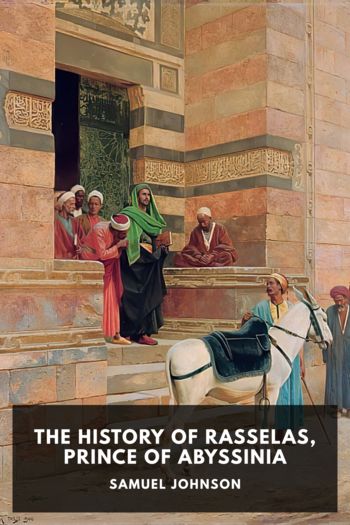The History of Rasselas, Prince of Abyssinia by Samuel Johnson (classic fiction txt) 📕

- Author: Samuel Johnson
Book online «The History of Rasselas, Prince of Abyssinia by Samuel Johnson (classic fiction txt) 📕». Author Samuel Johnson
When he had spoken he looked round him with a placid air, and enjoyed the consciousness of his own beneficence. “Sir,” said the Prince with great modesty, “as I, like all the rest of mankind, am desirous of felicity, my closest attention has been fixed upon your discourse: I doubt not the truth of a position which a man so learned has so confidently advanced. Let me only know what it is to live according to Nature.”
“When I find young men so humble and so docile,” said the philosopher, “I can deny them no information which my studies have enabled me to afford. To live according to Nature is to act always with due regard to the fitness arising from the relations and qualities of causes and effects; to concur with the great and unchangeable scheme of universal felicity; to cooperate with the general disposition and tendency of the present system of things.”
The Prince soon found that this was one of the sages whom he should understand less as he heard him longer. He therefore bowed and was silent; and the philosopher, supposing him satisfied and the rest vanquished, rose up and departed with the air of a man that had cooperated with the present system.
XXIII The Prince and His Sister Divide Between Them the Work of ObservationRasselas returned home full of reflections, doubting how to direct his future steps. Of the way to happiness he found the learned and simple equally ignorant; but as he was yet young, he flattered himself that he had time remaining for more experiments and further inquiries. He communicated to Imlac his observations and his doubts, but was answered by him with new doubts and remarks that gave him no comfort. He therefore discoursed more frequently and freely with his sister, who had yet the same hope with himself, and always assisted him to give some reason why, though he had been hitherto frustrated, he might succeed at last.
“We have hitherto,” said she, “known but little of the world; we have never yet been either great or mean. In our own country, though we had royalty, we had no power; and in this we have not yet seen the private recesses of domestic peace. Imlac favours not our search, lest we should in time find him mistaken. We will divide the task between us; you shall try what is to be found in the splendour of Courts, and I will range the shades of humbler life. Perhaps command and authority may be the supreme blessings, as they afford the most opportunities of doing good; or perhaps what this world can give may be found in the modest habitations of middle fortune—too low for great designs, and too high for penury and distress.”
XXIV The Prince Examines the Happiness of High StationsRasselas applauded the design, and appeared next day with a splendid retinue at the Court of the Bassa. He was soon distinguished for his magnificence, and admitted, as a Prince whose curiosity had brought him from distant countries, to an intimacy with the great officers and frequent conversation with the Bassa himself.
He was at first inclined to believe that the man must be pleased with his own condition whom all approached with reverence and heard with obedience, and who had the power to extend his edicts to a whole kingdom. “There can be no pleasure,” said he, “equal to that of feeling at once the joy of thousands all made happy by wise administration. Yet, since by the law of subordination this sublime delight can be in one nation but the lot of one, it is surely reasonable to think that there is some satisfaction more popular and accessible, and that millions can hardly be subjected to the will of a single man, only to fill his particular breast with incommunicable content.”
These thoughts were often in his mind, and he found no solution of the difficulty. But as presents and civilities gained him more familiarity, he found that almost every man who stood high in his employment hated all the rest and was hated by them, and that their lives were a continual succession of plots and detections, stratagems and escapes, faction and treachery. Many of those who surrounded the Bassa were sent only to watch and report his conduct: every tongue was muttering censure, and every eye was searching for a fault.
At last the letters of revocation arrived: the Bassa was carried in chains to Constantinople, and his name was mentioned no more.
“What are we now to think of the prerogatives of power?” said Rasselas to his sister: “is it without efficacy to good, or is the subordinate degree only dangerous, and the supreme safe and glorious? Is the Sultan the only happy man in his dominions, or is the Sultan himself subject to the torments of suspicion and the dread of enemies?”
In a short time the second Bassa was deposed. The Sultan that had advanced him was murdered by the Janissaries, and his successor had other views or different favourites.
XXV The Princess Pursues Her Inquiry with More Diligence Than SuccessThe Princess in the meantime insinuated herself into many families; for there are few doors through which liberality, joined with good humour,





Comments (0)